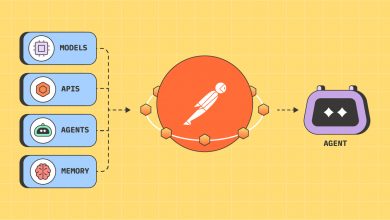Ai Copilot Pair Programmer – Augmenting Software Developer Productivity with Ai
Integrated into popular code editors like Visual Studio Code, IntelliJ, and Neovim, Copilot leverages advanced language models to understand context and generate code.
 Satya Nadella describes a powerful vision for the future of coding with AI.
Satya Nadella describes a powerful vision for the future of coding with AI.
Central to this is GitHub Copilot, an AI-powered coding assistant developed by GitHub in collaboration with OpenAI and Microsoft, designed to enhance developer productivity by providing real-time code suggestions, completions, and even entire functions based on natural language prompts.
Integrated into popular code editors like Visual Studio Code, IntelliJ, and Neovim, Copilot leverages advanced language models to understand context and generate code, making it a transformative tool in software development.
Intelligent Pair Programmer
Imagine a world where every line of code you write is amplified by an tireless, brilliant partner—one that never sleeps, never tires, and brings a universe of knowledge to your fingertips. Picture a creative collaboration where your ideas spark instantly into existence, refined and optimized in real time by a mind that thrives on patterns, logic, and possibility.
This is no longer a distant dream—it’s the reality unfolding before us today. Welcome to the age of Copilot Pair Programming, where human ingenuity and artificial intelligence converge to redefine the art and science of software development.
At its core, GitHub Copilot acts as an intelligent pair programmer, analyzing the code a developer is writing and offering context-aware suggestions in real time. By interpreting comments, function names, and existing code, Copilot can generate snippets, complete lines, or suggest entire blocks of code across numerous programming languages, including Python, JavaScript, TypeScript, and C#.
For example, a developer might write a comment like “create a function to fetch user data from an API,” and Copilot will propose a complete function, including error handling and API call logic, tailored to the project’s context. This capability stems from its training on vast datasets of public code repositories and natural language, enabling it to understand both programming syntax and developer intent.
In one regard the role of AI in software development can be thought of as the “Ai Pair Programmer”. Pair programming is a software development technique in which two programmers work together at one workstation, to synchronize a dual function of writing and reviewing code at the same time.
Ai innovations are creating the means to replicate this approach, leveraging AI as a collaborative partner in programming tasks. Copilots empowers developers of all skill levels. From beginners learning the ropes to seasoned professionals tackling complex projects, Copilots provide valuable insights and suggestions that elevate the coding experience for all users.
Beyond code generation, Copilot can explain code, suggest optimizations, and even assist with writing unit tests or debugging, making it a versatile tool for developers of all skill levels.
DevOps Integration
Copilot’s integration into development environments enhances its usability, embedding seamlessly into workflows without requiring developers to leave their editors. It operates as an extension, displaying suggestions in a dropdown or inline, which developers can accept, modify, or reject with minimal effort.
The tool also supports natural language queries through features like Copilot Chat, where developers can ask questions like “how do I implement a sorting algorithm in Python?” and receive detailed code examples or explanations.
This conversational interface extends Copilot’s utility beyond traditional coding, enabling non-programmers to experiment with coding tasks. For instance, a data analyst using Python in Excel, as Nadella has noted, can leverage Copilot to write scripts for data analysis without deep programming knowledge, aligning with Microsoft’s goal of democratizing software development.
The impact of GitHub Copilot on productivity is significant, with studies and developer feedback indicating it can reduce coding time by up to 55% for certain tasks. It accelerates repetitive tasks like writing boilerplate code, formatting, or implementing common algorithms, allowing developers to focus on higher-level design and problem-solving.
Nadella has emphasized that Copilot is already generating a substantial portion of code in Microsoft’s own projects, signaling a shift toward AI-augmented development where human developers act as orchestrators of AI-generated code. For businesses, this translates to faster development cycles and lower barriers to entry, enabling smaller teams or less experienced developers to tackle complex projects.
Copilot’s ability to learn from project-specific context also improves its suggestions over time, making it particularly valuable in large, collaborative codebases.
Challenges
Despite its strengths, Copilot is not without challenges. Critics have raised concerns about the quality of its suggestions, which can occasionally include inefficient or insecure code, especially if the training data includes outdated or suboptimal patterns.
There have also been debates about intellectual property, as Copilot was trained on public code, raising questions about licensing and attribution. GitHub has addressed these by implementing filters to avoid reproducing copyrighted code verbatim and emphasizing that Copilot generates suggestions, not final products, leaving responsibility with the developer.
Additionally, the tool’s reliance on cloud-based processing requires an internet connection, and its performance can vary depending on the complexity of the task or the specificity of the prompt. Nadella acknowledges such risks in AI systems, advocating for governance and human oversight to ensure reliability and ethical use.
What the Future Holds
Looking ahead, GitHub Copilot is poised to evolve as part of Microsoft’s broader vision for AI-powered coding and multi-agent systems. Nadella envisions Copilot integrating with agent-driven ecosystems, where it collaborates with other AI agents to orchestrate tasks across platforms, such as pulling data from a database or automating deployment pipelines.
Future enhancements may include deeper integration with Microsoft 365, enabling Copilot to assist with non-coding tasks like generating documentation or automating workflows in tools like Excel or Teams. GitHub is also exploring enterprise features, such as Copilot for Business, which offers enhanced security and customization for organizations, and Copilot Workspace, a platform for end-to-end project planning and coding.
These advancements align with Nadella’s prediction that AI tools like Copilot will shift developers toward designing architectures and managing AI agents, rather than writing every line of code manually.
Conclusion
In summary, GitHub Copilot represents a paradigm shift in software development, blending AI-driven code generation with human creativity to accelerate and democratize coding. Its ability to suggest, explain, and optimize code has made it a vital tool for developers, while its integration into Microsoft’s ecosystem positions it as a key player in the future of AI-driven workflows.
While challenges like code quality and ethical concerns persist, ongoing improvements and Nadella’s vision for agent-centric systems suggest Copilot will continue to redefine how software is built, enabling developers and businesses to navigate an increasingly AI-driven world with greater efficiency and innovation.



